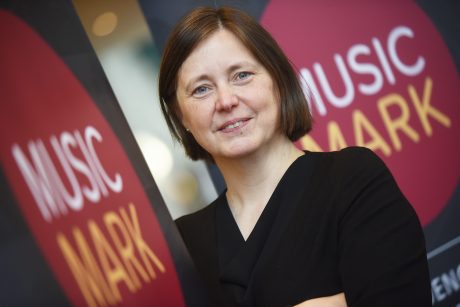Bridget’s Blog: An Easter break of music-making
4th April 2022

Music Mark CEO Bridget Whyte
As many colleagues head into the first week of their Easter Break (and for others they have just one more week to go!) I am reminded of the excitement of Easter as a child. Yes, there was the anticipation of getting an Easter Egg, but actually I was more excited about the residential course I would attend with Hampshire Music Service at Bryanston School in Dorset. As a small child I attended because my parents were working on it (Mum as part of the house staff and Dad as conductor of the Wind Training Orchestra), but later on I went as a member of one of the ensembles. What I remember most is the wall-to-wall music making across the week.
I didn’t really think about what a privilege it was to be part of each course at the time, but now I realise that it had a profound effect on me and is a key part of why I studied music at university and even more so for why I do what I do now. The age range of the students taking part in the ensembles was about 8 or 9 years – the youngest around 10 and the eldest 18 or 19 (plus the small group of young children, like me in the first few years) – and yet everyone worked together. Of course the students had to in the formal ensembles, but there were groups practicing in between the rehearsals and sectionals for the informal concerts and a set of sporting competitions where age seemed not to matter (the paper aeroplane race was especially competitive!).
At our Music Education Hub Leaders’ Spring Summit last Friday we talked about the challenges the pandemic has posed in keeping ensembles going. We reflected on the many children and young people who gave up learning when the country went into Lockdown and of the pupils who were not introduced to the idea of learning an instrument so are now not there as ensembles have started up again. It is certainly making it difficult for some colleagues to continue to provide the range of ensembles they had pre-pandemic, and has seen many reconsider the ensemble offer provided. Some have also learnt from the online ensemble sessions they ran and are thinking about the wider social elements of ensembles or how to connect students between residential/holiday courses through online forums. But we also remembered how lots of young musicians kept playing and progressing throughout the pandemic lockdowns because they had already found that love of music. The skills of playing in a live ensemble may have got a bit rusty, but the passion for playing is still there.
It is clear that there are some difficulties ahead in recruiting to area, county and national ensembles as the pandemic effect passes through the progression pathways, but it is great to know that there are still students who are excited to be looking forward to an Easter residential course.
Bridget


